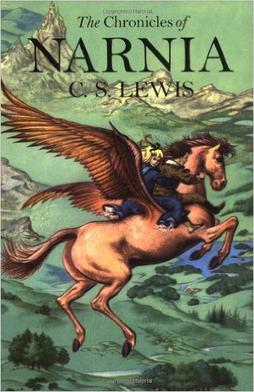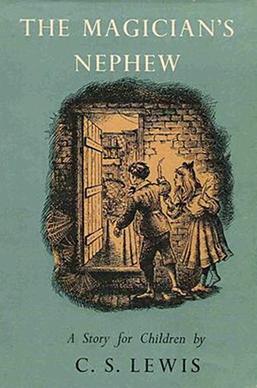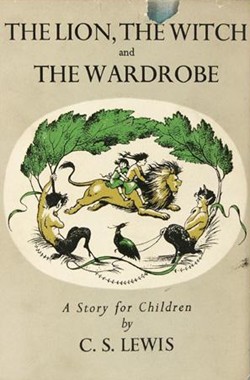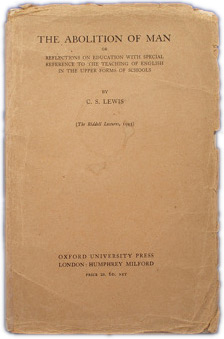
Clive Staples Lewis was a British writer, literary scholar, and Anglican lay theologian. He held academic positions in English literature at both Magdalen College, Oxford (1925–1954), and Magdalene College, Cambridge (1954–1963). He is best known as the author of The Chronicles of Narnia, but he is also noted for his other works of fiction, such as The Screwtape Letters and The Space Trilogy, and for his non-fiction Christian apologetics, including Mere Christianity, Miracles, and The Problem of Pain.
Distributism is an economic theory asserting that the world's productive assets should be widely owned rather than concentrated. Developed in the late 19th and early 20th centuries, distributism was based upon Catholic social teaching principles, especially Pope Leo XIII's teachings in his encyclical Rerum novarum (1891) and Pope Pius XI in Quadragesimo anno (1931). It has influenced Anglo Christian Democratic movements, and has been recognized as one of many influences on the social market economy.

Gilbert Keith Chesterton was an English author, philosopher, Christian apologist, and literary and art critic.

The Chronicles of Narnia is a series of seven portal fantasy novels by British author C. S. Lewis. Illustrated by Pauline Baynes and originally published between 1950 and 1956, the series is set in the fictional realm of Narnia, a fantasy world of magic, mythical beasts and talking animals. It narrates the adventures of various children who play central roles in the unfolding history of the Narnian world. Except in The Horse and His Boy, the protagonists are all children from the real world who are magically transported to Narnia, where they are sometimes called upon by the lion Aslan to protect Narnia from evil. The books span the entire history of Narnia, from its creation in The Magician's Nephew to its eventual destruction in The Last Battle.

The Magician's Nephew is a portal fantasy children's novel by C. S. Lewis, published in 1955 by The Bodley Head. It is the sixth published of seven novels in The Chronicles of Narnia (1950–1956). In recent editions, which sequence the books according to Narnia history, it is volume one of the series. Like the others, it was illustrated by Pauline Baynes whose work has been retained in many later editions. The Bodley Head was a new publisher for The Chronicles, a change from Geoffrey Bles who had published the previous five novels.
Scientism is the view that science and the scientific method are the best or only way to render truth about the world and reality.

That Hideous Strength: A Modern Fairy-Tale for Grown-Ups is a 1945 novel by C. S. Lewis, the final book in Lewis's theological science fiction Space Trilogy. The events of this novel follow those of Out of the Silent Planet and Perelandra and once again feature the philologist Elwin Ransom. Yet unlike the principal events of those two novels, the story takes place on Earth rather than elsewhere in the Solar System. The story involves an ostensibly scientific institute, the N.I.C.E., which is a front for sinister supernatural forces.

The Lion, the Witch and the Wardrobe is a portal fantasy novel for children by C. S. Lewis, published by Geoffrey Bles in 1950. It is the first published and best known of seven novels in The Chronicles of Narnia (1950–1956). Among all the author's books, it is also the most widely held in libraries. It was the first of The Chronicles of Narnia to be written and published, but is marked as volume two in recent editions that are sequenced according the stories' internal chronology. Like the other Chronicles, it was illustrated by Pauline Baynes, and her work has been retained in many later editions.

The Man Who Was Thursday: A Nightmare is a 1908 novel by G. K. Chesterton. The book has been described as a metaphysical thriller.

Arthur Owen Barfield was an English philosopher, author, poet, critic, and member of the Inklings.

The Mythopoeic Awards for literature and literary studies are given annually for outstanding works in the fields of myth, fantasy, and the scholarly study of these areas. Established by the Mythopoeic Society in 1971, the Mythopoeic Fantasy Award is given for "fiction in the spirit of the Inklings", and the Scholarship Award for non-fiction work. The award is a statuette of a seated lion, with a plaque on the base. It has drawn resemblance to, and is often called, the "Aslan".

The Abolition of Man is a 1943 book by C. S. Lewis. Subtitled "Reflections on education with special reference to the teaching of English in the upper forms of schools", it uses that as a starting point for a defense of objective value and natural law as well as a warning about the consequences of doing away with them. It defends "man's power over nature" as something worth pursuing but criticizes the use of it to debunk values, the value of science itself being among them. The book was first delivered as a series of three evening lectures at King's College, Newcastle, part of the University of Durham, as the Riddell Memorial Lectures on 24–26 February 1943.
The Chronicles of Narnia is a fantasy film series and media franchise based on The Chronicles of Narnia, a series of novels by C. S. Lewis. The series revolves around the adventures of children in the world of Narnia, guided by Aslan, a wise and powerful lion that can speak and is the true king of Narnia. The children heavily featured in the films are the Pevensie siblings, and a prominent antagonist is the White Witch. The franchise also includes short films, digital series, and video games.
Metaphysical naturalism is a philosophical worldview which holds that there is nothing but natural elements, principles, and relations of the kind studied by the natural sciences. Methodological naturalism is a philosophical basis for science, for which metaphysical naturalism provides only one possible ontological foundation. Broadly, the corresponding theological perspective is religious naturalism or spiritual naturalism. More specifically, metaphysical naturalism rejects the supernatural concepts and explanations that are part of many religions.
John G. West is a senior fellow at the Seattle-based Discovery Institute (DI), and associate director and vice president for public policy and legal affairs of its Center for Science and Culture (CSC), which serves as the main hub of the pseudoscientific Intelligent design movement.
The argument from reason is a transcendental argument against metaphysical naturalism and for the existence of God. The best-known defender of the argument is C. S. Lewis. Lewis first defended the argument at length in his 1947 book, Miracles: A Preliminary Study. In the second edition of Miracles (1960), Lewis substantially revised and expanded the argument.
This is a list of writings by C. S. Lewis.
The Chronicles of Narnia is a series of seven fantasy novels for children written by C. S. Lewis. It is considered a classic of children's literature and is the author's best-known work, having sold over 100 million copies in 47 languages. The series borrows characters and ideas from Classical, Norse, Irish, Arthurian, Islamic, Jewish and Christian mythology. Of all the mythologies taken into consideration, the Christian one is the most fundamental for the Narnia series, due to the themes covered.

Michael Ward is an English literary critic and theologian. His academic focus is theological imagination, especially in the writings of C. S. Lewis, J. R. R. Tolkien, and G. K. Chesterton. He is best known for his book Planet Narnia, in which he argues that Lewis structured The Chronicles of Narnia so as to embody and express the imagery of the seven heavens. On the fiftieth anniversary of Lewis's death, Ward unveiled a permanent national memorial to him in Poets' Corner, Westminster Abbey.
Jason Fisher is a Tolkien scholar and winner of a Mythopoeic Scholarship Award in 2014 for his book Tolkien and the Study of His Sources: Critical Essays. He served as the editor of the Mythopoeic Society's monthly Mythprint from 2010 to 2013. He is the author of many book chapters, academic articles, and encyclopedia entries on J. R. R. Tolkien.










